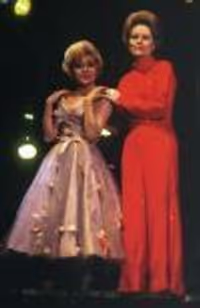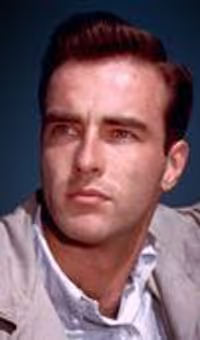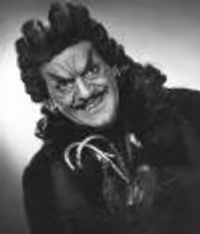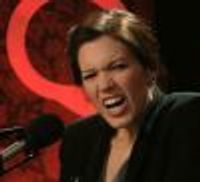SAVING MR. BANKS - Disney's New Film About The Making Of MARY POPPINS
#50SAVING MR. BANKS - Disney's New Film About The Making Of MARY POPPINS
Posted: 7/12/13 at 7:02pm
You do have a point-- Poppins giving such a warm speech would be out of character.
There is no denying that Julie gave her best screen performance in MARY POPPINS. She deserved that Oscar.
#51SAVING MR. BANKS - Disney's New Film About The Making Of MARY POPPINS
Posted: 7/12/13 at 7:09pmShe should play the part again but this time with Jaden & Willow Smith as Jane & Michael.
#52SAVING MR. BANKS - Disney's New Film About The Making Of MARY POPPINS
Posted: 7/12/13 at 7:15pm
She would kill them, and if she didn't, I would kill them.
I had my fill of bratty kids as Jane and Michael in the Broadway show. It ruined it for me.
Well, that and 30 other things.
blocked: logan2, Diamonds3, Hamilton22
JohnyBroadway
Broadway Legend Joined: 4/10/12
#53SAVING MR. BANKS - Disney's New Film About The Making Of MARY POPPINS
Posted: 7/12/13 at 7:16pmLuckily Cameron Mackintosh was able to sweet talk her into handing him the stage rights to do a stage adaption!
#54SAVING MR. BANKS - Disney's New Film About The Making Of MARY POPPINS
Posted: 7/12/13 at 8:07pm
Walt Disney was not universally respected by his employees. He always had problems with working on a "team." He was very much the dictator, not a collaborator.
He faced an animator's strike in the '40s, a lot of employee turnover, and many HR problems.
To his credit, those close to Walt in the workplace knew that Walt's negative work ethics were only a result of his unbelievably strong passions and dedication to his work. They understood him, and knew how to interact with him. New employees, however, would have to be eased into "Walt's way of doing things."
Walt wasn't an evil boss, but he could bite.
--Aristotle
#55SAVING MR. BANKS - Disney's New Film About The Making Of MARY POPPINS
Posted: 7/13/13 at 12:39am
Well, it sounds like she really challenged a guy who was perhaps used to being surrounded by yes people at that point in his career. Just my impression of the scenario through the trailer and the discussion here, which is very interesting.
Updated On: 7/13/13 at 12:39 AM
#56SAVING MR. BANKS - Disney's New Film About The Making Of MARY POPPINS
Posted: 7/13/13 at 8:47am
I have an unreasonable hate-on for anything Tom Hanks--and an unreasonable hard-on for most things Disney related, but, I admit, this looks pretty great. Walt was an unpleasant man by most accounts, but I'm tired of how much he's been vilified by so many people of my generation I know (I seriously have been told he was a secret Nazi by several people.)
I wonder, and doubt, if this bit from the New Yorker article get's through--I wish it would: The première was the first Travers had seen of the movie—she did not initially receive an invitation, but had embarrassed a Disney executive into extending one—and it was a shock. Afterward, as Richard Sherman recalled, she tracked down Disney at the after-party, which was held in a giant white tent in the parking lot adjoining the Chinese Theatre. “Well,” she said loudly. “The first thing that has to go is the animation sequence.” Disney looked at her coolly. “Pamela,” he replied, “the ship has sailed.” And then he strode past her, toward a throng of well-wishers, and left her alone, an aging woman in a satin gown and evening gloves, who had travelled more than five thousand miles to attend a party where she was not wanted..
#57SAVING MR. BANKS - Disney's New Film About The Making Of MARY POPPINS
Posted: 7/13/13 at 9:25am
^ Such spinning!
It sounds like she flew all the way out there to go to the premiere and never talked with Disney before then.
I'm sure she hadn't seen the finished film, but she was in L.A. serving as an advisor on the project. There was nothing in her contract about approving a final cut. That would have been suicide on Disney's part. That's what this whole movie is about. He spoke plenty with her, and got PLENTY of advice. And that's it. She did have in her contract approval of the casting of Mary, which was a huge hurdle to overcome. She didn't like Julie Andrews for the part at all, and had to be convinced by Disney and by Julie that she could play it.
Feature films were and are often edited together up until the last possible minute before the premiere, making any number of adjustments before it is considered "locked." And even then movies are occasionally edited after they've had a premiere or opened (usually at great expense, to save a failing project).
If Pamela had been there watching rough cuts the film never would have opened. He didn't extend that courtesy, and he never should have extended that courtesy. No one in their right mind would do that. Even if she had adapted the screenplay herself, she would not have had any say in the final cut. Film is a director's medium and a producer's medium, not a writer's medium. They call the shots (literally). It's a very different world than theatre.
It was because she was such a pain in the ass and they all knew she would raise a stink in front of the press and media that she wasn't invited. Can you imagine if she'd walked out of the theatre saying, "Well, that was terrible!" Disney knew she wouldn't ever be satisfied with it, and the last thing he wanted was to have the author of the books go public at the premiere in front of the press, saying, "That sucked!"
But this sounds like she's some castaway orphan, this kindly British woman, whom they all shunned. She earned her "non-invitation" all by herself.
She was paid handsomely for the rights, hired as a consultant, and after many "difficult" rounds with Walt and the creative team, she was politely shown the door. But she walked back through it anyway, only to be told "The ship has sailed."
Again, I say that was nice, compared to, "F*ck off, Pamela! You're a pain in the ass!"
blocked: logan2, Diamonds3, Hamilton22
#58SAVING MR. BANKS - Disney's New Film About The Making Of MARY POPPINS
Posted: 7/13/13 at 11:05am
I'm reminded of Anne Rice's disapproval of INTERVIEW WITH A VAMPIRE, only to rave about it later.
Same thing applies. Both authors sold the rights, knowing exactly what they were going to get into. You have no right to complain after you've eaten the hamburger, Mary.
#59SAVING MR. BANKS - Disney's New Film About The Making Of MARY POPPINS
Posted: 7/13/13 at 11:23am
I understand the feeling of dread you feel as an artist when you feel you've sold out, especially concerning a creation that is very dear to your heart. It must have been very difficult to have pop culture always refer to "Walt Disney's Mary Poppins" instead of "P.L. Travers' Mary Poppins". It's a huge blow to the ego to see something take off so much further without you.
But that's where my sympathy ends for Travers. She made her decision to allow the adaptation to happen, and no matter how put out she felt, she also made the choice to be tactless and unprofessional about it during and after production/release.
Lack of sympathy aside, I think that tension and conflict helped to create the wonderful movie we have. I'm a firm believer that surrounding yourself with "yes men" suffocates the creative process and leads to very bland, though expensive looking, work. (example: Star Wars original trilogy vs. the prequels)
#60SAVING MR. BANKS - Disney's New Film About The Making Of MARY POPPINS
Posted: 7/13/13 at 12:06pm
I thought she was enthusiastic about Julie Andrews, by calling her and saying she "had the nose for it?"
mikey2573
Broadway Legend Joined: 12/28/10
#61SAVING MR. BANKS - Disney's New Film About The Making Of MARY POPPINS
Posted: 7/13/13 at 12:29pm
"I was told by one of his big child stars of yesteryear that he was very protective of and kind to the kids who worked for him,"
Tell that to Bobby Driscoll --or maybe you could say it over his grave, if anyone knew where it was.
"In his biography on Disney Marc Elliot described Driscoll as the producer's favorite "live action" child star: "Walt often referred to Driscoll with great affection as the living embodiment of his own youth" However, during a project meeting following the completion of Peter Pan, Disney stated that he now saw Driscoll as best suited for roles as a young bully rather than a likeable protagonist. Driscoll's salary at Disney had been raised to $1750 per week and compared to his salary, Driscoll had little work from 1952 on. In March 1953, the additional two-year option Driscoll had been extended (which would have kept him at Disney into 1956) was canceled, just weeks after Peter Pan was released theatrically. A severe case of acne accompanying the onset of puberty and explaining why it was necessary for Driscoll to use heavy makeup for his performances on dozens of TV shows, was officially provided as the final reason for the termination of his connection with the Disney Studios.
On March 30, 1968, about three weeks after his 31st birthday, two boys playing in a deserted East Village tenement at 371 East 10th St. found his body. The medical examination determined that he had died from heart failure caused by an advanced hardening of the arteries because of his longtime drug abuse. There was no identification on the body, and photos taken of it and shown around the neighborhood yielded no positive identification. When Driscoll's body went unclaimed, he was buried in an unmarked pauper's grave in New York City's Potter's Field on Hart Island."
"I have found that memories are not very useful. I was carried on a silver platter ... and then dumped into the garbage."
---Bobby Driscoll
#62SAVING MR. BANKS - Disney's New Film About The Making Of MARY POPPINS
Posted: 7/13/13 at 12:39pm
You have that story, but then you have the guy who played Moochie, and the woman who played Jane Banks breaking down in tears when talking about his death.
#63SAVING MR. BANKS - Disney's New Film About The Making Of MARY POPPINS
Posted: 7/13/13 at 12:52pm
The story of Bobby Driscoll is awful--but it's true he seemed to be a pretty schizo man in terms of how he dealt with his child stars.
The full New Yorker article, btw is online I just realized in 6 long pages in their free section http://www.newyorker.com/archive/2005/12/19/051219fa_fact1
I still think the film looks delightful--I hope it is. I've come to my own mixed conclusions and beliefs about Walt Disney a while back--and those probably won't change. He was my first big hero. And probably the first person I held to esteem and then realized was not everything I thought.
#64SAVING MR. BANKS - Disney's New Film About The Making Of MARY POPPINS
Posted: 7/14/13 at 4:25pmWell "the ship has sailed", but I don't see Walt Disney in Tom Hanks at all. Would be cool if De Niro had done it instead.
#65SAVING MR. BANKS - Disney's New Film About The Making Of MARY POPPINS
Posted: 7/17/13 at 10:19pmI have highly mixed feelings about Walt Disney. I adore Disneyland and Disney World. When I visited elderly relatives in California and couldn't get anyone to go with me, I went to Disneyland alone, and rode Pirates of the Caribbean about 6 times. Yet, I too, remember reading that Walt Disney was anti-Semitic -- quite an irony considering Eisner's later running the company.
#66SAVING MR. BANKS - Disney's New Film About The Making Of MARY POPPINS
Posted: 7/17/13 at 10:37pm
There are many examples of authors and screenplay writers who hated the final films they are associated with. It's been coming up in several other threads lately.
Roald Dahl hated the 1971 film Willy Wonka and the Chocolate Factory. He gets solo screenplay credit, adapted from his own book, yet they called in David Selter to ghost write and change 30 percent of the final shooting script. Dahl had no say. It's what Mel Stuart (the director) wanted.
Noel Langley left the premier of The Wizard of Oz in tears. He was a 26-year-old screenplay writer who wrote the initial "approved" draft for the MGM film. But the studio hired Florence Ryerson and Edgar Allen Wolf to come in and "punch up" the script with Vaudeville jokes and light humor. All three received final screen credit with Langley listed first. He didn't get to see the final film until the premier, and he left it in tears, saying "they ruined it."
William Peter Blatty won an Oscar for adapting his novel The Exorcist, but many things changed from his final shooting script (including the ending) at the hand of director William Friedkin.
Stephen King has gone on record now saying he hates Kubrick's film of The Shining.
That's the way it works.
blocked: logan2, Diamonds3, Hamilton22
#67SAVING MR. BANKS - Disney's New Film About The Making Of MARY POPPINS
Posted: 7/24/13 at 11:04pm
New One Sheet Poster

#68SAVING MR. BANKS - Disney's New Film About The Making Of MARY POPPINS
Posted: 7/24/13 at 11:04pmGod, that's a beautiful poster.
#69SAVING MR. BANKS - Disney's New Film About The Making Of MARY POPPINS
Posted: 7/24/13 at 11:12pmThat's one of the most successful onesheets I have seen for a non-popcorn flick. It tells you exactly what the film will be about, features two prominent actors, and grabs your interest with the shadows of two iconic images. No doubt it will help spark interest to those who see the poster but haven't heard of the movie.
--Aristotle
#70SAVING MR. BANKS - Disney's New Film About The Making Of MARY POPPINS
Posted: 7/24/13 at 11:16pmThat is one of the most imaginative posters I have seen. Wow! I need to get one and frame it.
#71SAVING MR. BANKS - Disney's New Film About The Making Of MARY POPPINS
Posted: 7/24/13 at 11:19pmAlso, it's interesting to note that the poster revelas a PG-13 rating for the film.
#72SAVING MR. BANKS - Disney's New Film About The Making Of MARY POPPINS
Posted: 7/24/13 at 11:29pm
Great poster. Looks a teensy bit familiar.

Updated On: 7/24/13 at 11:29 PM
#73SAVING MR. BANKS - Disney's New Film About The Making Of MARY POPPINS
Posted: 7/25/13 at 6:52am^ Ugh. Hate this cloying, manipulative. overlong piece of crap.
#74SAVING MR. BANKS - Disney's New Film About The Making Of MARY POPPINS
Posted: 7/25/13 at 7:17am
I like the poster a lot. I also like that the shadows are larger than the people themselves.
Symbolic and true to life.
blocked: logan2, Diamonds3, Hamilton22
Videos










